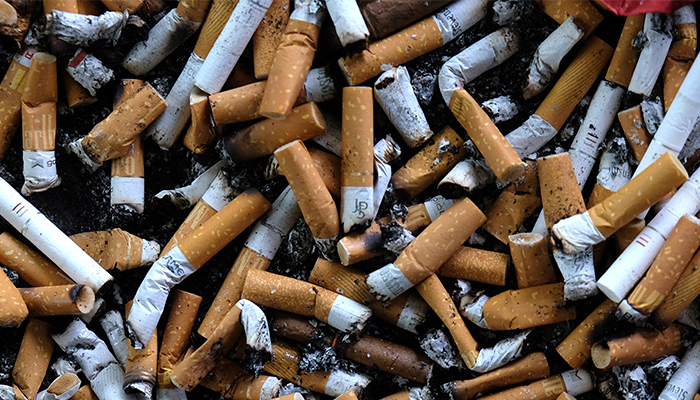Taxing tobacco begins to deliver
Islamabad:Malik Imran Ahmed, Country Director, Campaign for Tobacco Free Kids (CTFK) said that the tobacco industry had expressed discontent over the increase of FED claiming it would result in the shutdown.
However, the FBR’s data has challenged the industry’s assertion showing a significant 40 percent share of the FED. Independent experts have emphatically called upon the FBR to implement World Bank’s recommendation advising increase in FED on cigarettes, in a recent report Pakistan Development Update (PDU). “A substantial revenue gain of 0.4 per cent of GDP could be achieved if the current rate on premium cigarettes (Rs16.50 per cigarette) was also applied to standard cigarettes,” the report said.
The guidelines of the WHO Framework Convention on Tobacco Control (FCTC) also emphasise the pivotal role of taxation as a primary tool in mitigating tobacco consumption. The government’s decision to raise the Federal Excise Duty (FED) on cigarettes has yielded a notable increase in revenue while simultaneously contributing to a reduction in cigarette consumption. The Federal Board of Revenue (FBR) Yearbook 2022-23 substantiated the noteworthy development, according to which the share of cigarettes in the overall FED collection has escalated to 40 per cent.
The report said that the share of the top ten sectors is about 94 percent and cigarette stood at top of the list followed by cement with 18.7 percent and concentrates 9.6 per cent share. This upswing is chiefly attributed to the imposition of higher FED rates on cigarettes. The fiscal year 2022-23 saw three significant upward revisions, ending a three-year stagnation period. “One of the major sectors which contributed to FED revenues included cigarettes due to both inflation and increase in excise duty rates,” the FBR Yearbook said.
As cigarette consumption diminishes, the consequential reduction in health-related issues could result in a positive impact on healthcare expenditures, contributing to a healthier and more sustainable society. The decrease in tobacco usage also aligns with the broader public health objective. A study by the Pakistan Institute of Development Economics brings attention to the significant economic impact of the use of tobacco, according to which costs linked to diseases and deaths resulting from smoking in 2019 reached a staggering Rs615.07 billion, equivalent to 1.6 per cent of the GDP.
-
 Sterling K. Brown's Wife Ryan Michelle Bathe Reveals Initial Hesitation Before Taking On New Role
Sterling K. Brown's Wife Ryan Michelle Bathe Reveals Initial Hesitation Before Taking On New Role -
 BAFTA Film Awards Winners: Complete List Of Winners Updating
BAFTA Film Awards Winners: Complete List Of Winners Updating -
 Millie Bobby Brown On Her Desire To Have A Big Brood With Husband Jake Bongiovi
Millie Bobby Brown On Her Desire To Have A Big Brood With Husband Jake Bongiovi -
 Biographer Exposes Aftermath Of Meghan Markle’s Emotional Breakdown
Biographer Exposes Aftermath Of Meghan Markle’s Emotional Breakdown -
 Backstreet Boys Admit Aging Changed Everything Before Shows
Backstreet Boys Admit Aging Changed Everything Before Shows -
 Ryan Coogler Makes Rare Statements About His Impact On 'Black Cinema'
Ryan Coogler Makes Rare Statements About His Impact On 'Black Cinema' -
 Rising Energy Costs Put UK Manufacturing Competitiveness At Risk, Industry Groups Warn
Rising Energy Costs Put UK Manufacturing Competitiveness At Risk, Industry Groups Warn -
 Kate Middleton Makes Glitzy Return To BAFTAs After Cancer Diagnosis
Kate Middleton Makes Glitzy Return To BAFTAs After Cancer Diagnosis -
 NFL Star Rondale Moore Dies Aged 25, Minnesota Vikings Pay Tribute
NFL Star Rondale Moore Dies Aged 25, Minnesota Vikings Pay Tribute -
 Kim Kardashian Makes Huge Career Move Weeks After Going Public With Lewis Hamilton
Kim Kardashian Makes Huge Career Move Weeks After Going Public With Lewis Hamilton -
 Shia LaBeouf Draws Attention For Sweet Reason After Spending Time In Jail Over Brawl Incident Amid Mardi Gras Bash
Shia LaBeouf Draws Attention For Sweet Reason After Spending Time In Jail Over Brawl Incident Amid Mardi Gras Bash -
 Princess Eugenie, Beatrice Receive Strong Warning After Andrew Arrest: 'Zero Tolerance'
Princess Eugenie, Beatrice Receive Strong Warning After Andrew Arrest: 'Zero Tolerance' -
 Rihanna 38th Birthday Detail Breaks The Internet, Featuring Unexpected Huge Item
Rihanna 38th Birthday Detail Breaks The Internet, Featuring Unexpected Huge Item -
 Liza Minnelli Recalls Rare Backstage Memory With Mum Judy Garland In New Memoir
Liza Minnelli Recalls Rare Backstage Memory With Mum Judy Garland In New Memoir -
 Armed Intruder Shot Dead At Trump's Mar-a-Lago Residence: US Secret Service
Armed Intruder Shot Dead At Trump's Mar-a-Lago Residence: US Secret Service -
 Total Lunar Eclipse: What You Need To Know And Where To Watch
Total Lunar Eclipse: What You Need To Know And Where To Watch




